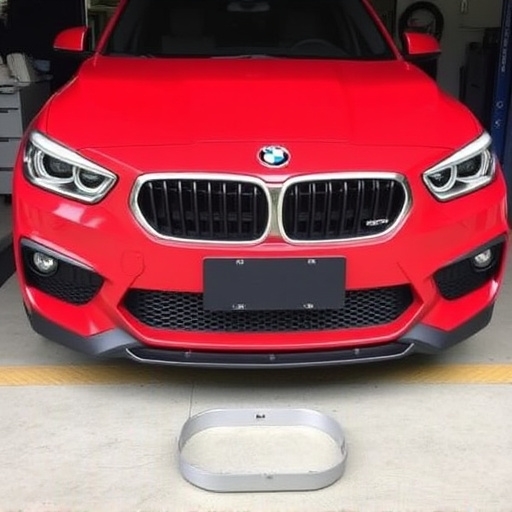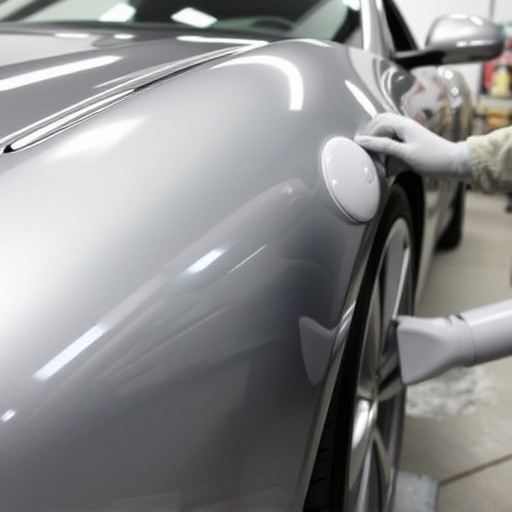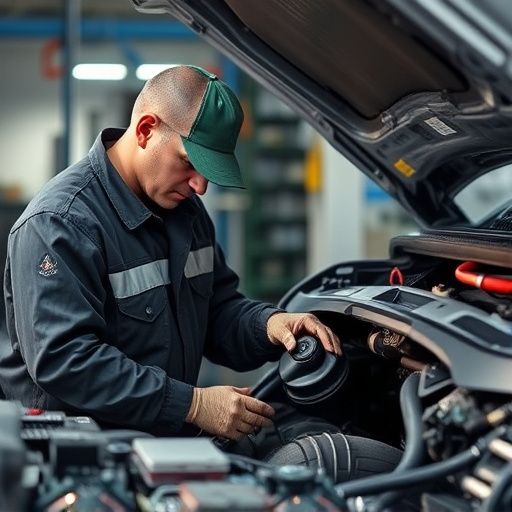Radiator support systems are vital for vehicle performance and environmental sustainability, maintaining optimal engine temperatures and preventing overheating. When replacing these components, modern body shops prioritize eco-friendly practices by using lightweight, recycled materials, recycling old parts, and minimizing energy consumption. Efficient radiator support replacement reduces vehicles' carbon footprints and contributes to a greener automotive industry. Utilizing sustainable materials, proper disposal, and local suppliers further minimizes environmental impact, making it both responsible and advantageous for collision centers to adopt these practices.
When undertaking a radiator support replacement, environmental considerations are no longer an afterthought but a core aspect. This article delves into the sustainable dimensions of this process, exploring the ecological impact of both traditional and eco-friendly materials. We dissect the recycling potential of discarded components and offer insights on green installation practices. Furthermore, we provide guidance on post-replacement care to ensure longevity and minimize environmental footprint, making your radiator support replacement a responsible choice.
- Understanding Radiator Support Systems and Their Environmental Impact
- The Sustainability Aspects of Replacement: Materials and Recycling
- Eco-Friendly Practices in Installation and Post-Replacement Care
Understanding Radiator Support Systems and Their Environmental Impact

Radiator support systems play a critical role in a vehicle’s overall performance and environmental sustainability. These components are integral to maintaining optimal engine temperature, ensuring efficient cooling, and preventing overheating. Over time, the radiator support—a vital part of this system—may require replacement due to wear and tear or damage. When considering radiator support replacement, it’s essential to understand the environmental implications.
The process involves more than just swapping out a part; it’s an opportunity to minimize the ecological footprint associated with car bodywork services. Modern vehicle body shops often prioritize eco-friendly practices, ensuring that old parts are recycled or disposed of responsibly. Moreover, the introduction of new radiator support components can lead to enhanced energy efficiency in vehicles, reducing the overall carbon footprint, especially when coupled with other car paint repair and maintenance tasks.
The Sustainability Aspects of Replacement: Materials and Recycling

When considering environmental sustainability in radiator support replacement, it’s crucial to look at both the materials used and recycling practices. The traditional approach often involves heavy metal components, which can have significant environmental impacts during manufacturing, installation, and eventual disposal. Many modern solutions, however, promote sustainability by offering lightweight alternatives made from recycled or eco-friendly materials. These innovations not only reduce carbon footprints but also minimize the energy demands associated with production, contributing to a greener radiator support replacement process.
In addition to material choices, effective recycling programs are integral to sustainable vehicle body repair. Collision centers and auto shops can play a vital role by ensuring that old radiator supports and related parts are properly recycled or reused. This involves implementing efficient dent removal techniques and adopting strategies that prevent waste generation during radiator support replacement procedures. By embracing these practices, the automotive industry can move towards a more eco-conscious future while addressing essential vehicle maintenance tasks.
Eco-Friendly Practices in Installation and Post-Replacement Care

When conducting a radiator support replacement, adopting eco-friendly practices is both responsible and beneficial. These include using sustainable materials whenever possible, such as recycled or biodegradable components, to minimize the environmental impact of the automotive repair process. Additionally, ensuring proper disposal of old parts and safe handling of any hazardous materials are key aspects of these efforts.
Post-replacement care plays a significant role in maintaining an eco-friendly approach. Regular maintenance checks can help extend the lifespan of the new components, reducing the need for frequent replacements. Moreover, opting for local suppliers and recyclers for future automotive repair needs contributes to a more sustainable collision center environment. This holistic approach not only benefits the planet but also ensures that car collision repair processes are in line with modern environmental stewardship standards.
In conclusion, considering environmental factors during radiator support replacement is essential for a sustainable future. By understanding the impact of these systems, adopting eco-friendly materials and practices, and promoting proper installation and post-replacement care, we can significantly reduce the ecological footprint associated with this process. Embracing these environmental considerations not only benefits the planet but also ensures longer-lasting solutions, ultimately making it a prudent step for both homeowners and professionals in the automotive industry.














